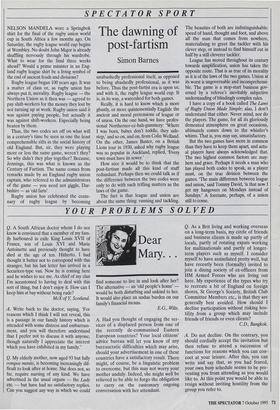YOUR PROBLEMS SOLVED
• •
Dear Mary.
Q. A South African doctor whom I do not know is convinced that a member of my fam- ily harboured in exile King Louis XVII of France, son of Louis XVI and Marie Antoinette and previously thought to have died at the age of ten. Hitherto, I had thought it better not to correspond with this stranger, but his last letter has arrived in a Securicor-type van. Now he is coming here and he wishes to see me. As chief of my clan I'm accustomed to having to deal with this sort of thing, but I don't enjoy it. How can I keep him at bay without being rude?
McX of Y, Scotland.
A. Write back to the doctor, saying, 'For reasons which I think I will not reveal, this is a passage in our family history which is attended with some distress and embarrass- ment, and you will therefore understand that I prefer not to discuss it with anyone, though naturally I appreciate the interest which you have exhibited in my family.' - Q. My elderly mother, now aged 93 but fully compos mends, is becoming increasingly dif- ficult to look after at home. She does not, so far, require nursing of any kind. We have advertised in the usual organs — the Lady etc. — but have had no satisfactory replies. Can you suggest any way in which we could find someone to live in and look after her? The alternative — an 'old people's home' — would be both disturbing and unkind to her. It would also place an undue burden on our family's financial means. E.G., Wilts.
A. Had you thought of engaging the ser- vices of a displaced person from one of the recently de-communised Eastern European countries? Your local citizens' advice bureau will let you know of any bureaucratic difficulties which may arise, should your advertisement in one of these countries have a satisfactory result. There might, of course, be a linguistic problem to overcome, but this may not worry your mother unduly. Indeed, she might well be relieved to be able to forgo the obligation to carry on the customary ongoing conversation with her attendant. Q. As a Brit living and working overseas on a long-term basis, my circle of friends and business clients is made up partly of locals, partly of rotating expats working for multinationals and partly of longer- term players such as myself. I consider myself to have assimilated pretty well, but have recently been (formally) invited to join a dining society of ex-officers from HM Armed Forces who are living out here. My experience of the types who try to recreate a bit of England on foreign shores, St George's Society, British Club Committee Members etc., is that they are generally best avoided. How should decline participation without risking hos- tility from a group which may include friends of friends or even clients?
CD., Bangkok A. Do not decline. On the contrary, you should cordially accept the invitation but then refuse to attend a succession of functions for reasons which you can con- coct at your leisure. After this, you can write and say that, as you had feared, your own busy schedule seems to be pre- venting you from attending as you would like to. At this point you would be able to resign without inviting hostility from the group you refer to.










































































 Previous page
Previous page